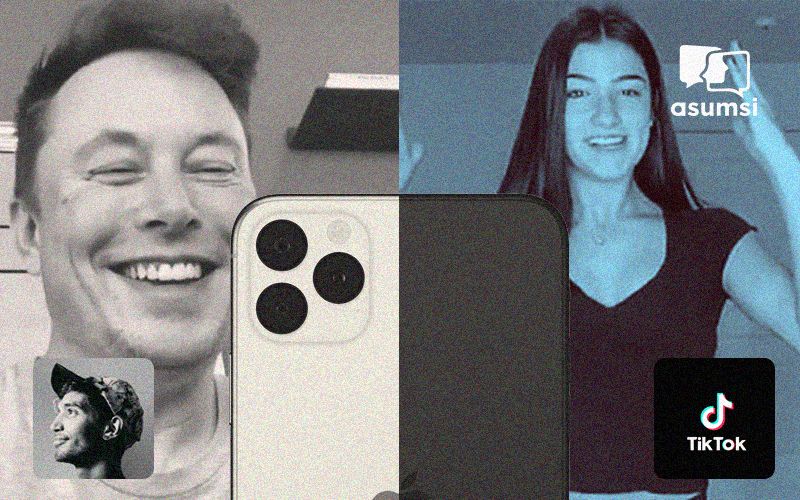Clubhouse, TikTok: Escapism for Young and Old
Is Clubhouse the TikTok for olds? Obviously the apps are completely different but the way they quickly captured their own audience and trigger the sense of FOMO among peers is uncanny.
While TikTok may have the likes of Charli D’Amelio, Addison Rae, and Jason Derulo to thank for its rise, with their dance moves and hip-shaking tracks, Clubhouse’s audience seems to be attracted to people like Elon Musk, MC Hammer, and actress Justine Bateman, people who are on the platform to talk about their careers, achievements, and the state of their industry. In a word, olds.
Let’s face it, Clubhouse is boomer space and as far as Gen Zs are concerned, older Millennials and Gen Xers are boomers.
Throughout 2020 Clubhouse was attracting the wrong kind of coverage. Because of its exclusivity to the iPhone and requiring phone number invitations or insiders to join, few people outside of the Silicon Valley circles could participate in the conversations in the app.
The app was becoming a space for Silicon Valley insiders to openly criticize the tech media in a way that’s been characterized as similar to how the Gamergate movement demonized the game industry media. In late 2020, Clubhouse was criticized for allowing a discussion to turn into an attack on the Jewish community during Yom Kippur, one of their holiest days.
At that point there was no content moderation or ways to report people for harassment or inappropriate conduct, something that the app’s developers have since remedied and remain focused on to ensure civil discourse across all of its chat rooms. These days room moderators are increasingly encouraged and empowered to maintain a respectable level of discussions but for now, it’s still early, and better tools are being explored by the developers to help moderators do their job.
Meanwhile, TikTok wasn’t without its own share of controversy with allegations of user data being fed to the Chinese government which allegedly had control over the platform. A number of content and content creators critical of China had seemingly been removed or hidden from search which led to those accusations, and America’s Trump government at the time threatened to block TikTok while India and other countries actually did block the app out of concerns around national security, content, as well as usage frequency.
Bytedance, which operates TikTok and its Chinese counterpart app Douyin, denied the allegations on sharing data with the Chinese government and introduced ways to limit usage within the app. Meanwhile, American companies such as Walmart, Microsoft, and even Oracle offered to purchase and operate the app in the so called “western” jurisdictions. This obviously didn’t happen and Trump ended up being voted out.
In Indonesia, 13-year old Prabowo Mondardo, who goes by the name Bowo Alpenliebe, became an early star on the app in 2018 when each of his videos kept going viral until one day he was blocked by the app for some unclear reason.
Although Bowo’s popularity added to the perception that TikTok is a niche app, one that’s for kids and for silly dances, that didn’t last too long. The quarantine days of 2020 actually drew even more users to TikTok and cemented the platform as the premiere music discovery app with dozens of songs, including a few from Indonesia, such as a cover of Potret’s Bagaikan Langit and Lathi by Weird Genius, reaching global popularity almost entirely because they’ve been used in TikTok videos. Bowo’s eventual return to TikTok this year coincided with Elon Musk tweeting about being on Clubhouse, which drew millions to the vocal media app.
Clubhouse’s main attraction, at least currently, is how it has the ability to bring the experience of multi-session seminars and industry conferences that typically feature high profile speakers, directly to people’s smartphones at home, for free, instead of having to pay millions of rupiahs to attend. You could say that it’s the perfect app for these Covid-enforced home quarantine times.
Clubhouse may have not been around for that long, but those who recently joined have managed to spend hours and hours per day on the app talking or listening to other people talking. As if they haven’t spent enough time in Zoom meetings.
Is Clubhouse here to stay? The same question was asked of TikTok years ago and back then it was seen as a fad, another app that tries to fill in the void left by the shutdown of Vine, Twitter’s popular six second video app, and yet here we are. Clubhouse may have gone global but it’s still too early to say what will become of the app five years down the road especially as the company is still working on adding Android support and ways to monetize the app both for themselves and for the speakers and hosts.
What’s clear is that it’s becoming a place for Millennials and Gen Xers to hang out online and escape the realities of home quarantine similar in a way that Gen Zs are hanging out on TikTok.
Editor’s note:
This opinion piece has been translated to Indonesian.
__________________________
Aulia Masna is a technology journalist whose writings have appeared in various major local and international publications. Most recently, he was part of the App Store team at Apple and previously led the editorial teams at Recap, AdDiction, DailySocial, and Macworld Indonesia.









